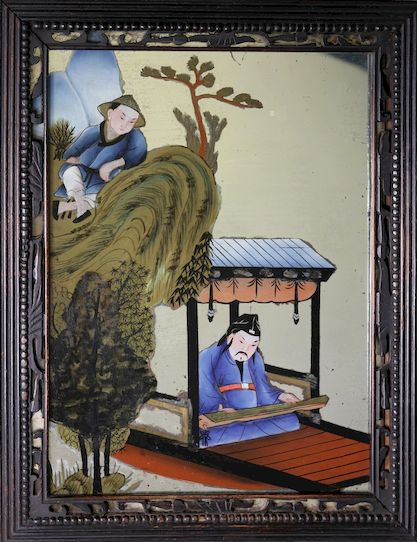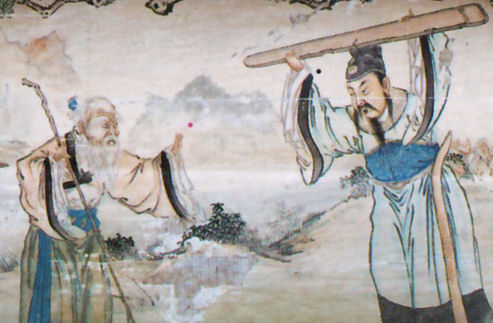
“As he finished playing it, he was surprised to hear loud applause from the shore.”
(Reverse Glass Painting from the Mei Lin Collection [Rupprecht Mayer and Haitang Mayer-Liem])"
YÚ Bóyá 俞伯牙 = an underappreciated but brilliant musician
ZHŌNG Zǐqí 钟子期 = a woodsman who appreciates him
In Hànyáng 汉阳, in Húběi 湖北 Province, there is a place called Zither Terrace (Gǔqín Tái 古琴台). It is named in memory of a great musician of the Zhōu 周 dynasty (period 04) by the name of YÚ Bóyá 俞伯牙.
Yú, though young, was famous for his extraordinary talent at playing the zither. But despite the pleasure that such praise brought to him, it was always also a great disappointment to him that, upon examination, those who praised his ability nevertheless did not actually understand his music.

On the night of one Mid-Autumn Festival (the 15th day of the 8th lunar month), Yú was aboard a river boat docked near Hànyáng enjoying the scenery and improvising a melody.
As he finished playing it, he was surprised to hear loud applause from the shore, which proved to come from a humble young woodsman by the name of ZHŌNG Zǐqí 钟子期. Yú invited him to come on board, and discussed music with him, and was quite amazed at his deep understanding.
At length, Yú realized that he had at last found a soul-mate who understood his music. Although it was inconvenient that they were widely divergent in social class, Yú proposed that they become sworn brothers, and he and Zhōng took the oath.
It was sad that Yú had to leave to continue his journey, but they agreed that they should meet exactly one year later when he would be able to return.
A year passed, and at last Yú was able to return to the area, and looked forward to meeting his brother Zhōng again. But when he arrived, Zhōng was nowhere to be seen. Yú called and called, and he played the zither hoping to draw Zhōng to him, but Zhōng did not appear.

At length, Yú saw a grave along the river, strangely positioned so that it overlooked the water. He was horrified to discover that it was the grave of his sworn brother Zhōng Zǐqí, which had been built in such a way as to catch the possible sounds of a zither being played aboard a boat. Yú was heartbroken. He played a final melody, then smashed his zither, vowing never to play again, for he had lost the only companion who had ever been able to understand the music he produced.
Ever since that day, the expression “knowing sounds” (zhī yīn 知音) has referred to an intimate friend, one who knows your heart, sometimes a lover.